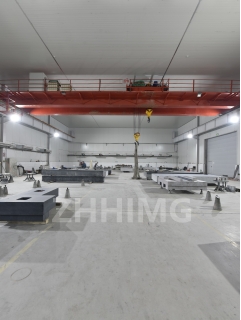Precision granite components have become increasingly popular over the years due to their durability, stability, and high precision. These components are used in a wide range of applications, from aerospace and automotive industries to semiconductor manufacturing and machining. While precision granite components have many benefits, some people may wonder if their production has any impact on the environment. In this article, we will explore the potential environmental impact of the production of precision granite components.
First, it is important to note that granite is a natural resource that is widely available in many parts of the world. Granite is a type of igneous rock that is formed from magma that cools slowly underground. The unique properties of granite make it an ideal material for precision components, including its high density, low thermal expansion, and superior stability. Granite is also resistant to wear, corrosion, and weathering, making it a sustainable and long-lasting material for industrial applications.
In terms of environmental impact, the production of precision granite components can have some negative effects. For example, the process of extracting and quarrying granite can lead to soil erosion, loss of biodiversity, and air and water pollution. Additionally, the transportation of granite from quarries to production facilities can contribute to greenhouse gas emissions and energy consumption.
However, many companies that produce precision granite components have implemented sustainability initiatives to mitigate these impacts. For example, some companies source their granite from quarries that prioritize environmental conservation, such as those that have received certification from organizations like the Forest Stewardship Council or the Rainforest Alliance. Additionally, some companies invest in renewable energy sources and emission-reducing technologies to minimize their carbon footprint.
Furthermore, precision granite components have several benefits that could positively impact the environment. For example, these components can help reduce energy consumption and waste in industrial processes. Precision granite components can also enhance the durability and lifespan of machinery, reducing the need for frequent replacement and disposal. Additionally, the use of precision granite components can improve the accuracy and efficiency of manufacturing processes, which can lead to decreased waste and lower environmental impact.
In conclusion, the production of precision granite components may have some negative impact on the environment, but there are also ways to mitigate these effects through sustainable sourcing and production practices. Furthermore, the use of precision granite components can have many positive impacts on the environment, such as reducing waste and energy consumption and improving the efficiency of manufacturing processes. As such, companies and industries that utilize precision granite components should prioritize sustainability and environmental conservation to ensure a better future for our planet.
Post time: Mar-12-2024

